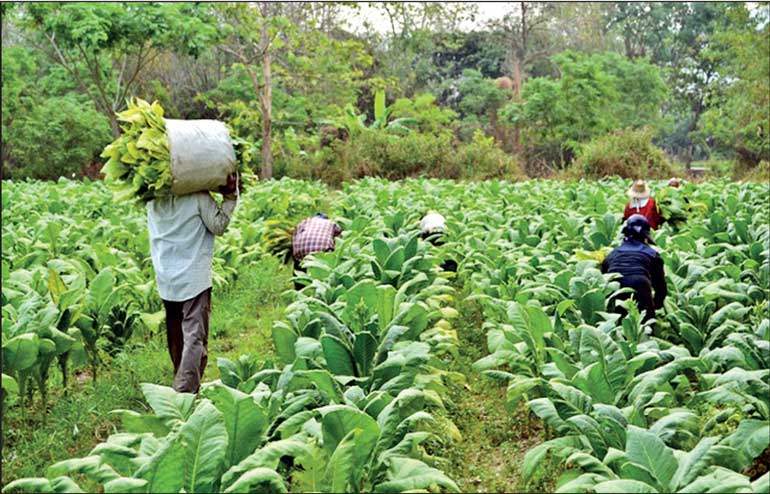Sunday Feb 22, 2026
Sunday Feb 22, 2026
Friday, 28 April 2023 00:10 - - {{hitsCtrl.values.hits}}

Tobacco farming is profitable, both for its farmers as well as for the country. Hence, it is vital that this remains a sincere consideration in the economic, regulatory, and environmental landscapes in Sri Lanka
By Kumar Ranaweera
Tobacco leaf farmers are amongst the unsung heroes of Sri Lanka’s domestic economy, infusing over Rs. 1.62 billion to rural value chains. As per reports, over 1,600 farmers are formally engaged in tobacco farming in Sri Lanka, but a cloud now hangs over their future with tobacco leaf purchases declining as cigarette production is tipped to drop due to its price increases.
Sri Lanka does not have an export market for tobacco leaf producers. The produce is primarily purchased by Ceylon Tobacco Company (CTC), the country’s sole licensed manufacturer of cigarettes. CTC reports point out that the use of hybrid seed varieties in some regions have resulted in exceptional yields for farmers in recent times. But with cigarette volumes declining, its cascading impact will soon be felt by the tobacco farming community.
Therein lies the double-edged sword. A drop in cigarette sales is welcomed by health authorities, but reports published by CTC, Sri Lanka Customs, and the Research Intelligence Unit point to substantial growth in cigarettes smuggled into Sri Lanka, which inevitably impacts revenue to the State and thereon the livelihoods of tobacco farmers in communities. With locally manufactured cigarette volumes dropping from 60% to as low a figure as 35% over the past 10 years, illicit cigarettes pose a threat to dominate Sri Lanka’s tobacco market. Wither the Sri Lankan tobacco farmer.
The income earned by tobacco farming is significant. Contracted farmers are guaranteed purchase of full crops at a pre-agreed price and are provided additional support to grow alternate crops such as fruits, vegetables, and maize. This offers stable income food security to farmers, in addition to the accrued benefits to the wider community. Though production is relatively small compared to other tobacco-producing nations, there is considerable value imparted to the community throughout this cycle.
It’s important therefore that policymakers at national and local level take note of these developments and implement adequate measures to safeguard the wellbeing and livelihood of tobacco farmers. What is often not considered is the wider impact of a fallout within a single community on the broader value chain. This was witnessed amply during the aftermath of the Easter attacks in Sri Lanka, when the decline in tourists severely impacted industry personnel as well as small time retailers on the street. On one hand, the Government must facilitate adequate protection for tobacco farmers, while on the other end, consider encouraging exports of Sri Lanka’s tobacco leaf crops.
Over the past century, tobacco farming in Sri Lanka has led to sustainable cycles around its growing operations, covering the spectrum of environmental preservation, community development, and industry skill development. Policy movements must be cognisant of the value in preserving such networks for the country and accordingly extend support where possible.
In conclusion, tobacco farming is profitable, both for its farmers as well as for the country. Hence, it is vital that this remains a sincere consideration in the economic, regulatory, and environmental landscapes in Sri Lanka.
(The writer is a Research Associate attached to a leading audit firm in Colombo, with a special interest in Agriculture and FMCG sectors.)